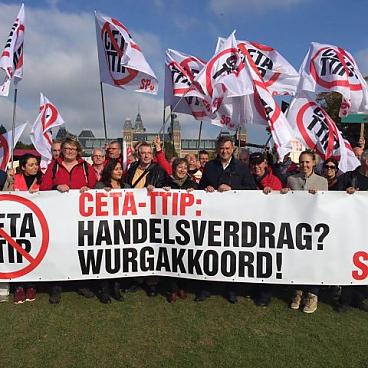Trade treaty with Japan a threat to democracy and a sustainable economy
Trade treaty with Japan a threat to democracy and a sustainable economy
The trade treaty currently being negotiated between the European Commission and Japan (JEFTA) will allow corporations to take governments to court if they introduce measures to protect people and the environment. This can be seen in documents from the talks made public this evening by Greenpeace. The proposed treaty, in contrast to earlier commitments, contains no more than a few ineffectively mild agreements to promote sustainability.
 According to SP Euro-MP Anne-Marie Mineur the Commission has learnt little from the widespread criticism of other trade treaties such as the TTIP and CETA. ‘The arbitration system known as Investor-State Dispute Settlement (ISDS) is there once again, despite Commissioner Malmström having sworn that she had taken the mass protests to heart,” she says. “The right to make our own policies without having to fear that foreign corporations will claim millions in compensation is scarcely protected. Even the Paris climate accord is at risk from this. It goes directly against the opinions of the European Parliament, the rulings of the European Court of Justice on public involvement in decision-making in regard to such treaties, and even against the Commission’s own trade policies which they made such a song and dance about last year. In this way I can see TTIP making a comeback.”
According to SP Euro-MP Anne-Marie Mineur the Commission has learnt little from the widespread criticism of other trade treaties such as the TTIP and CETA. ‘The arbitration system known as Investor-State Dispute Settlement (ISDS) is there once again, despite Commissioner Malmström having sworn that she had taken the mass protests to heart,” she says. “The right to make our own policies without having to fear that foreign corporations will claim millions in compensation is scarcely protected. Even the Paris climate accord is at risk from this. It goes directly against the opinions of the European Parliament, the rulings of the European Court of Justice on public involvement in decision-making in regard to such treaties, and even against the Commission’s own trade policies which they made such a song and dance about last year. In this way I can see TTIP making a comeback.”
SP Member of Parliament Maarten Hijink has put oral questions on the proposed treaty to the Dutch government and is demanding a debate. “The agreements in this treaty are completely at odds with what Trade Minister Lilianne Ploumen has told Parliament,” he says. “We need much better commitments on sustainability, and we’re not getting them. We don’t need any more special courts to which corporations have access but the public has none; but these courts are being set up all the same. Ploumen wanted a ‘reset’ of trade policy, but in this treaty what we’re getting is party time for corporate capital, at the expense of people and the environment.”
